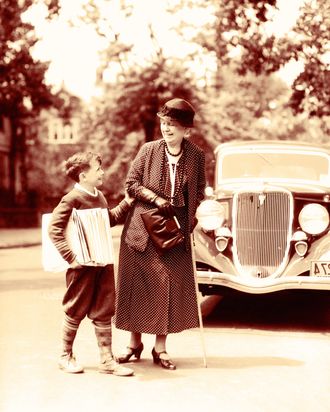
It’s nice to think that you’re the type of person who would help an old lady cross Houston Street or some lost European tourists finally make their way to Ground Zero, but not everybody has the personality for it, at least according to a new study.
The study, published this month in the journal Personality and Social Psychology Bulletin, finds people who make prosocial — as in, benefiting others — actions are likely to be high in the Big 5 personality trait agreeableness, with maybe a dash of neuroticism. (In personality psychology, the Big 5 is the most rigorously verified and replicated model; the other traits are conscientiousness, extraversion, and openness to experience.) As you might assume from the name, agreeable people are sincerely, perhaps unbearably, pleasant; words like cooperative, friendly, supportive, empathic, and humble all describe it. They really love social approval, and they’re more likely to use Facebook to communicate or help people rather than complain or seek attention. Disagreeable people don’t give a fig about what you think of them and make for the most disruptive of entrepreneurs, since they don’t need social approval. Neuroticism, the personality trait most in need of a rebranding, speaks to how easily destabilized people are by stimuli. In their paper, University of Iowa psychologist Meara M. Habashi and her colleagues argue that agreeableness primes “empathic concern” for the well-being of others, which leads to action.
In keeping with other research on helping, Habashi and her colleagues used different “vignette” exercises in three different experiments, where participants (the now-standard mixture of Amazon Mechanical Turk freelancers and university students) heard about various poignant scenarios, like if they were late to a friend’s speech and spotted a stranger lying facedown on their way in — what do they do? In another, the participants hear about a college student whose parents and sibling died, and she had to take care of two youngs sibs and keep the family together (it’s called the Katie Banks paradigm, and it’s often used for studying helping). Respondents were asked to report their emotional experiences of hearing about these tragedies, and in the case of Katie Banks, college students were asked how much time they’d be able to volunteer their help, and if they’d like to donate money to help her out. The researchers found that people who tested highly for agreeableness and neuroticism were likely to report feelings of empathy, while agreeableness predicted actually helping. Obviously, there are limits to a study such as this: A vignette is not a real-life experience, but it’s a good way to simulate one, as attested to how reading serious fiction trains people in empathy.
Previous research on agreeableness found that agreeable people tend to be happier than everybody else because they excel at “emotion regulation” — they try to avoid negative experiences, and put themselves into those situations that match the pleasantness of their personality. There’s something poetic, then, about helping: Seeing someone in need is uncomfortable, but if you help them out, it turns into a happy memory — rather than something you’d rather forget.




